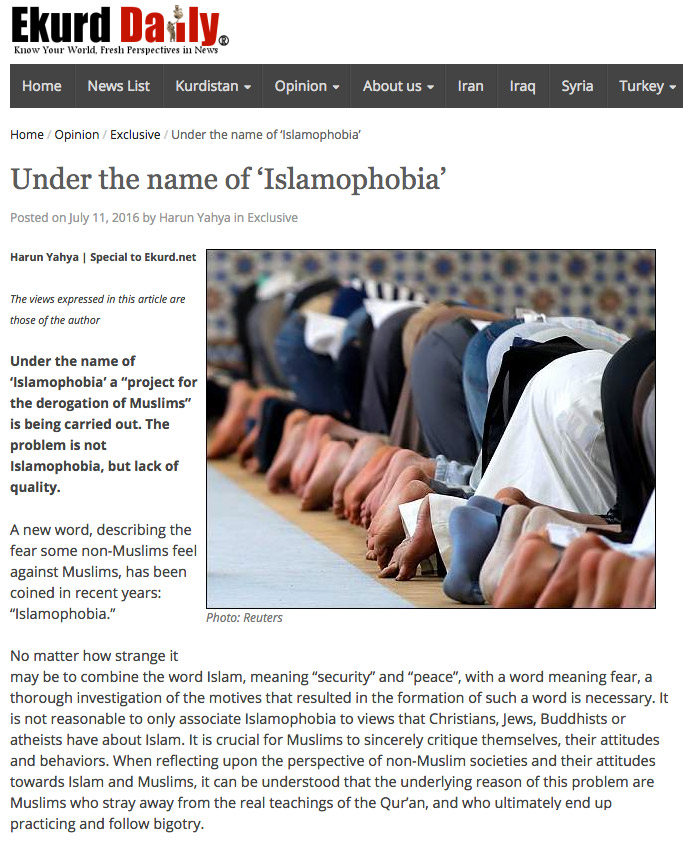Bigotry: The Dark Danger
Under the name of ‘Islamophobia’

Under the name of ‘Islamophobia’ a “project for the derogation of Muslims” is being carried out. The problem is not Islamophobia, but lack of quality.
A new word, describing the fear some non-Muslims feel against Muslims, has been coined in recent years: “Islamophobia.”
No matter how strange it may be to combine the word Islam, meaning “security” and “peace”, with a word meaning fear, a thorough investigation of the motives that resulted in the formation of such a word is necessary. It is not reasonable to only associate Islamophobia to views that Christians, Jews, Buddhists or atheists have about Islam. It is crucial for Muslims to sincerely critique themselves, their attitudes and behaviors. When reflecting upon the perspective of non-Muslim societies and their attitudes towards Islam and Muslims, it can be understood that the underlying reason of this problem are Muslims who stray away from the real teachings of the Qur’an, and who ultimately end up practicing and follow bigotry.
Bigotry has taken hold of a great portion of Muslim communities and intensified even further as they have adapted superstitions and fabricated hadiths into the pure teachings of the Qur’an. The fanatical mindset appalls the Western states due not only to the mindset but also the lifestyle that this mindset adopts. That is because, in the world of such bigots, Islam is being presented as if it were “a religion spreading poverty, misery, hopelessness, lovelessness, cold-heartedness, crassness and coarseness.” (Surely Islam is above all such claims) When a European, an American or an Australian looks at many of the Muslim countries, they predominantly see bigotry, and thus such a negative perception is formed. Slaughtering others simply out of sectarian differences, and depriving women and girls of their rights to a decent life, dressing poorly, being unclean, declaring paintings, statues, theatre, and music unlawful indeed contribute to that negative perception. Needless to say, such a perception causes a disturbance and a negative reaction in the world in general and makes some people assume an attitude against Islam.
The majority of Muslims fail to realize that this situation is caused by some Muslims who live by a misconstrued interpretation of Islam, far removed from the Qur’an and thus misrepresent Islam in the world. These people particularly accuse Westerners of taking a stand against Islam, ostracizing Muslims and acting in hostility towards them. Westerners do not react against the religion of Islam, but are against the misrepresented bigoted images and ideas that they witness.
Quality is one of the core foundations of Islam, as well as a characteristic of Heaven. Quality is also one of the most important, beautiful, and prized values in life. Any place that is lacking in quality would be difficult to live. Dark and dreary houses, and places with no aesthetic appeal would not bring happiness to people. In the absence of quality, the number of unhappy, depressed and unkempt people lacking any love increases. Such people will also have negative attitudes in the way they walk, talk, and deal with each other and will be unable to take any form of pleasure from their society and work. Such negativities and despair also create an atmosphere where violence can be encouraged, or accepted as part of the norm in that society. In short love, peace, and comfort is removed from the hearts of such individuals and people drift apart having animosity towards each other. Ultimately the lack of quality poses a major problem that perpetually leads the way to producing quarrelsome, discontented and loveless communities.
When it comes to Islam, one should conjure up a picture of the most civilized people with the highest standards and quality in the world. The Qur’an identifies and gives us a unique understanding of quality. According to the Qur’an, adopting the most advanced attitude in terms of compassion, affection, cleanliness, personal care, etiquette and manner is the basic characteristic of a Muslim. A Muslim is the one with the cleanest and the most beautiful attire; the one who eats and drinks in the most civilized way and practices social justice in the most perfect manner. The Qur’an is a Book revealed to the world based on these descriptions. For that reason, a lifestyle lacking quality and an understanding far removed from aesthetics are foreign for a Muslim.
A Muslim is an ultra-modern person with a broad perspective. Muslims appreciate arts and aesthetics and constantly seek to make life easier, more pleasant, and more efficient by adhering to a high quality set of standards in everything they do. A Muslim is intelligent and knowledgeable and would not fail to keep an open mind to learn new ideas. Such a person would constantly keep him or herself refreshed towards developing an ultra modern and high cultured lifestyle. A Muslim serves in an exemplary role with his attitudes and manners. He or she tries to beautify and embellish his environment and surroundings with greenery, flowers and trees, and constantly acts according to his good conscience. Despite such teachings of the Qur’an however, quality will not be even a matter of discussion in a world dominated by bigotry. The lack of quality, which has penetrated the Islamic world over time, has brought criticism, distrust, and a general repulsion in the minds of Western people. This has ultimately lead to perceptions that Muslims are insignificant and worthless. Antagonism against Islam has become a prominent issue mainly because of this false image. Muslims have thus been perceived “as people who should be oppressed, abused and humiliated.”
For such reasons, it is necessary to take urgent measures to change these perceptions by focusing on the real Islam and the high standards of quality that are associated with it, rather than reacting to those who follow a bigoted mindset. Quality should be adopted as part of a state or country’s policy. In this way, the Islamic community could efficiently repel the perilous mentality of the fanatics.
The fact that quality is an important characteristic of being a Muslim and a requirement of Islamic morality should be explained with evidence from the Qur’an. It is of critical importance to lay emphasis on the invalidity and falsity of the philosophy of living on “just enough to keep body and soul together” and on the fact that Muslims should aspire to attain the most beautiful, the highest quality and the cleanest of everything. It should be further explained in detail that lack of quality means a failure to understand the essence and the spirit of Islam. Therefore, everyone should bear in mind that quality serves as one of the most essential requirements for the process of becoming ultra civilized. Thus pioneering countries in this regard should be held up as examples. In this regard, the responsibility that is incumbent on the Western countries is to believe in Muslims who are in quest for peace and love, and to form alliances with them without taking a stand against Islam itself.
On the other hand, Muslims as a whole should carry out an intellectual fight against bigotry, promote the true Islam in the Qur’an and support their proponents.
By the leave of God, this is the only possible way for the word “Islamophobia” to fall out of use and for the hatred and anger that is now prevalent in the world to fade away and gradually by replaced by love, respect and affection.
Adnan Oktar's piece in Ekurd Daily & Jefferson Corner:
http://ekurd.net/under-name-islamophobia-2016-07-11
http://www.jeffersoncorner.com/under-the-name-of-islamophobia/




